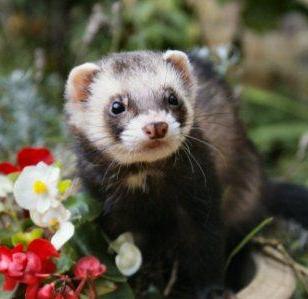

 |
Essex Ferret Welfare Society |  |
|
The Ferret is a type of domesticated polecat related to the stoat, weasel, mink etc. Ferrets can make great pets – being affectionate, playful and entertaining. However it must be understood that keeping ferrets involves time, attention and money. Ferrets are highly social creatures therefore it is usually advisable to keep more than one. They can live up to ten years and are a long term commitment not something to be left forgotten at the bottom of the garden. Ferrets have become increasingly popular as house pets. A good size cage is required while they are on their own – as ferrets sleep 18 hours a day they are suitable for working people because they are crepuscular (active in the morning and evenings). Ferrets kept indoors are usually allowed the run of the house while the owners are present. They are naturally very inquisitive so it is important to make sure the areas where they are allowed is safe for them – they can squeeze into surprisingly small spaces like the motor compartment of washing machines. They generally don’t chew cables but they are by nature diggers so cheap vinyl may be required to protect carpets by doors as they try to escape. They are naturally very neat about their toilet business – choosing one corner per room to do their business in – it’s a simple job to put a litter tray or pile of newspapers in that corner. Ferrets, like cats, are too independent in nature to be easily trainable, but will soon learn to come to the sound of a squeaky toy if they get a treat afterwards (invaluable for getting them out the sofa!). Ferrets being so inquisitive very much enjoy being taken for walks (take care with dogs in the area)– harness & leads are available to buy. Ferrets are obligate carnivores which means their natural diet consists only of meat. While there are several brands of commercial dried ferret food available, we at the Essex Ferret Welfare Society believe that these are too high in carbohydrates and that feeding ferrets wholly or partly with raw meat improves ferret’s health, smell level and overall lifespan. Meat that can be fed includes rabbit, pigeon, chicken and offal. We strongly recommend feeding a variety of different raw meats. Cooked, smoked and tinned meats (including bones) can be harmful Ferrets have a natural musky odour that is not that unpleasant, our rescue ferrets are all neutered, which along with a good diet and regular cleaning of cage, all go a long way to reduce smells to an acceptable level. We would recommend refreshing the toilet area of their cage on a twice daily basis – ferret wee being quite strong smelling. Even rescue ferrets are generally very tolerant to being handled. However ferrets love to playfight and bite each other quite hard when playing – it may take a while for them to learn they shouldn’t treat humans this way but with a bit of time and effort their behaviour can be improved. Even so the slight unpredictability of them means they are unsuitable for young children. Ferrets generally don’t get on with most other pets – cats and ferrets have the best chance of getting on – ferret play fighting may be a little rough on cats, however cats can generally can climb and escape. With careful supervised introduction, ferrets and dogs can get on. We hope this general introduction has given you a bit of insight to whether ferrets are the pets for you. We are always here to help and give out information. Ferrets are still unusual pets and not many people know much about them. There are several books available to buy that give general information you need to keep a ferret that you might otherwise not know, like the fact cages shouldn’t have wire floors. I hope this intro has not been off-putting – the simple fact it that ferrets can make great pets if they are treated correctly. Just to prove this here is a link to a video made by a happy ferret owner who over the last two years has re-homed four of our ferrets. |
 |